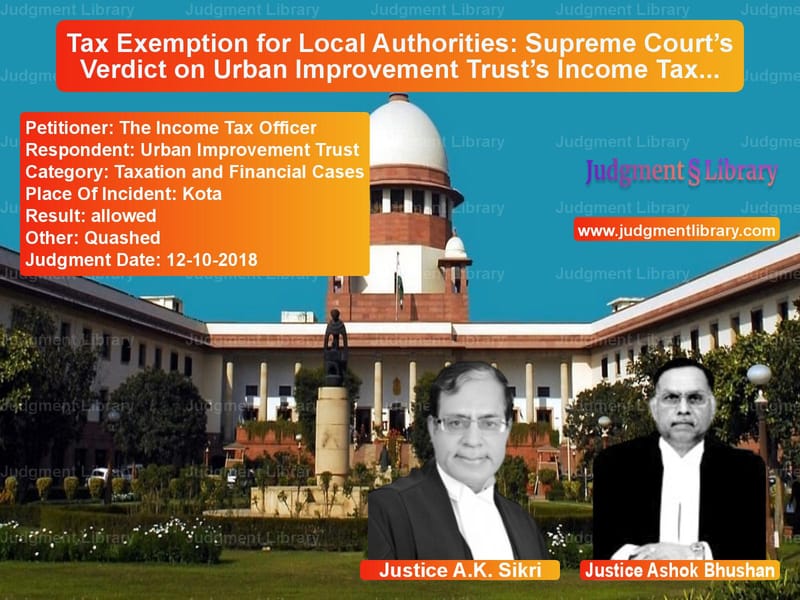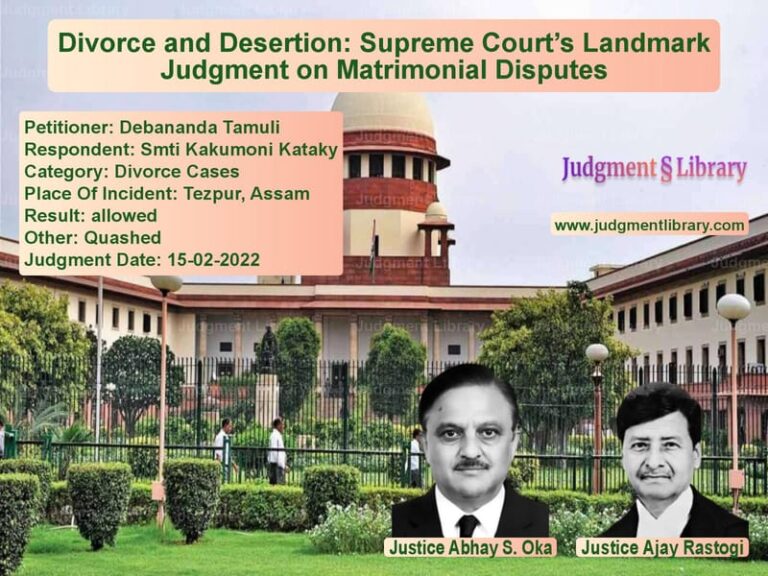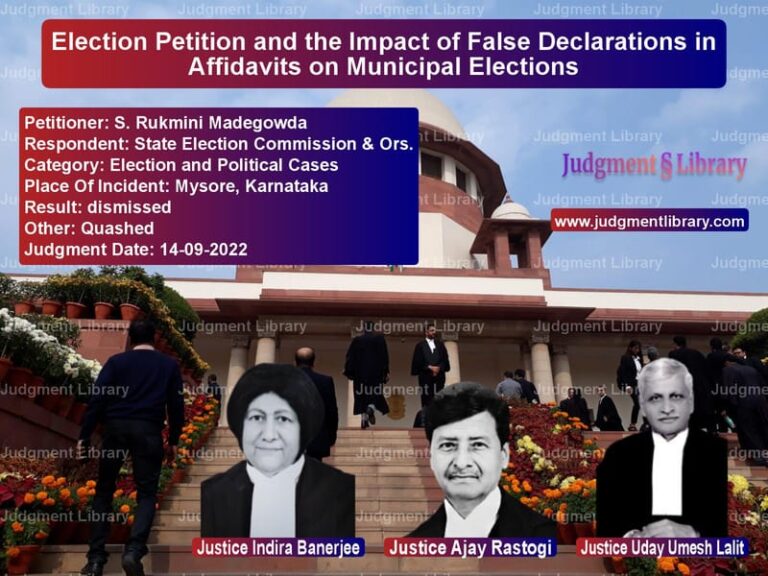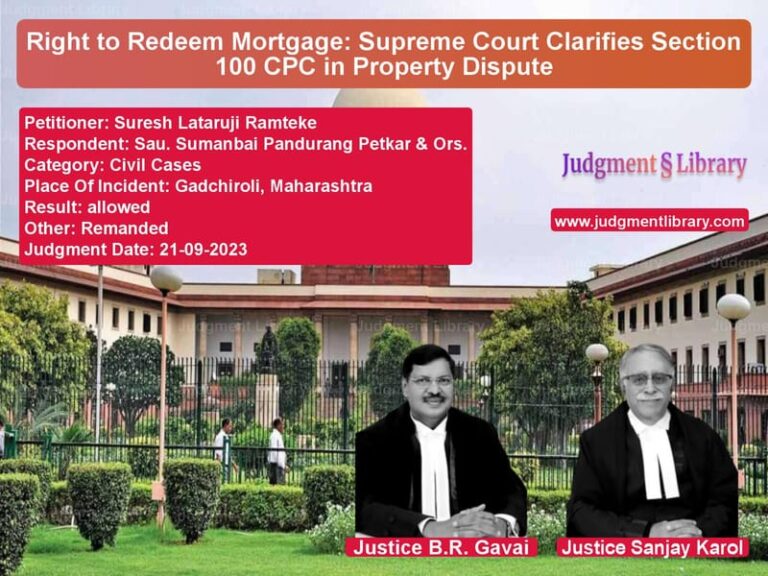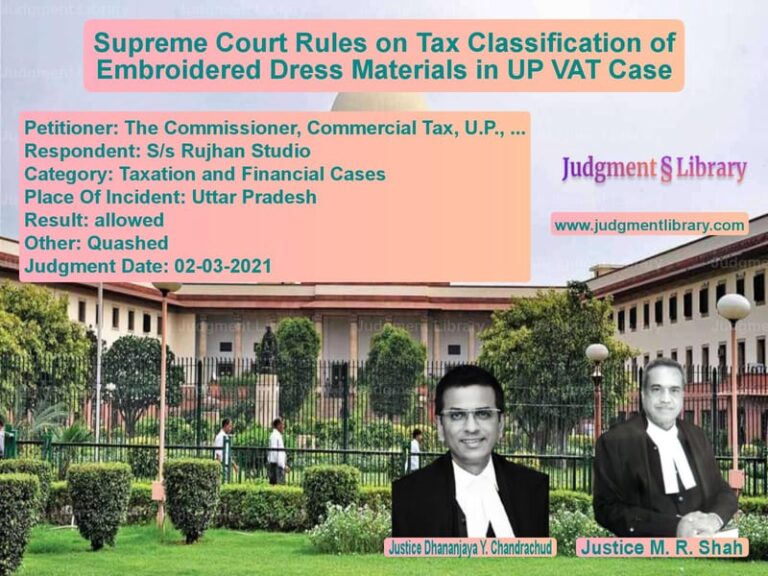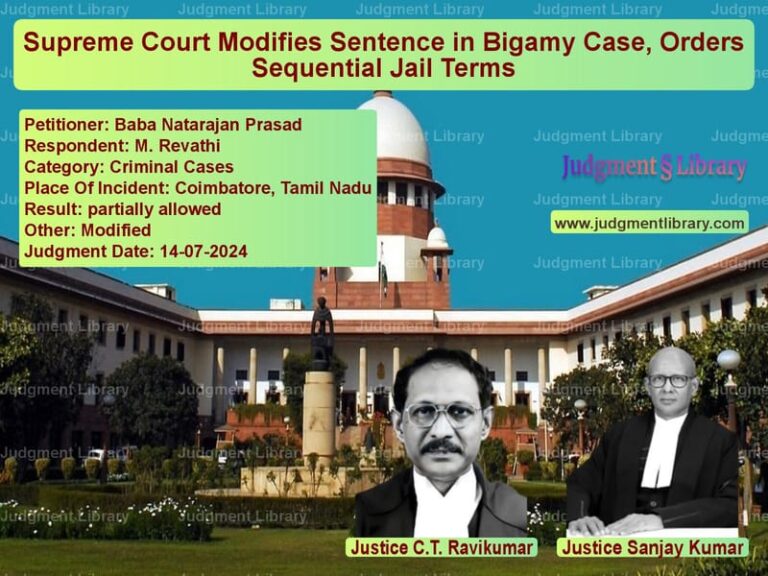Tax Exemption for Local Authorities: Supreme Court’s Verdict on Urban Improvement Trust’s Income Tax Status
The Supreme Court of India recently delivered a significant ruling in the case concerning the tax-exempt status of the Urban Improvement Trust under the Income Tax Act, 1961. The case revolved around whether the Urban Improvement Trust, an entity responsible for urban development in Rajasthan, qualified as a ‘local authority’ under Section 10(20) of the Income Tax Act and was, therefore, eligible for exemption from income tax.
Background of the Case
The dispute began when the Income Tax Department issued notices to the Urban Improvement Trust (UIT) to file income tax returns for the assessment year 2003-2004. The UIT argued that it was a local authority as per Section 10(20) of the Income Tax Act and was exempt from filing returns. However, the Assessing Officer rejected this claim and held that UIT was not a local authority under the amended definition in the Income Tax Act.
The case went through multiple appeals. The Commissioner of Income Tax (Appeals) ruled in favor of the UIT, stating that it was a local authority and thus eligible for tax exemption. The Income Tax Appellate Tribunal (ITAT) overturned this decision, siding with the Revenue Department. Subsequently, the Rajasthan High Court reversed the ITAT’s decision and upheld the UIT’s claim for tax exemption. The matter was then taken to the Supreme Court by the Revenue Department.
Key Issues Raised
- Does the Urban Improvement Trust qualify as a ‘local authority’ under the amended Section 10(20) of the Income Tax Act?
- Is UIT entitled to tax exemption as per the revised provisions of the Income Tax Act?
- Did the Rajasthan High Court correctly interpret the legal provisions while granting tax-exempt status to UIT?
Arguments of the Petitioners (Income Tax Department)
- The Revenue Department argued that Section 10(20) of the Income Tax Act had been amended by the Finance Act, 2002, to provide a restrictive definition of ‘local authority.’
- They contended that UIT was no longer covered under this definition and, therefore, could not claim tax exemption.
- They relied on the Supreme Court’s ruling in New Okhla Industrial Development Authority vs. Chief Commissioner of Income Tax (2018), where a similar claim by an industrial development authority was rejected.
- They emphasized that UIT performed urban development functions, but this did not make it a ‘Municipal Committee’ or ‘District Board’ under the Income Tax Act.
Arguments of the Respondents (Urban Improvement Trust)
- UIT maintained that it was entrusted with municipal functions such as urban planning, infrastructure development, and town planning, making it functionally equivalent to a municipality.
- They contended that their activities were covered under Article 243P of the Constitution, which defines municipalities.
- The respondents argued that UIT was a ‘Municipal Committee’ within the meaning of Section 10(20) Explanation (iii) and, therefore, should continue to enjoy tax exemption.
- They emphasized that UIT collected funds, levied charges, and exercised control over urban areas similar to municipal bodies.
Supreme Court’s Analysis
The Supreme Court thoroughly examined the legislative history of Section 10(20) and its amendments. It noted that before the Finance Act, 2002, a broader definition of ‘local authority’ included housing boards, development authorities, and improvement trusts. However, after the amendment, the law specifically restricted the definition to:
- Panchayats as per Article 243(d) of the Constitution
- Municipalities as per Article 243P(e)
- Municipal Committees and District Boards that legally control municipal or local funds
- Cantonment Boards
The Court noted that UIT was not a ‘Municipality’ under Article 243P of the Constitution. Additionally, it ruled that UIT did not qualify as a ‘Municipal Committee’ because:
- It was established under the Rajasthan Urban Improvement Act, 1959, which was different from the legal framework governing municipalities.
- It was created to carry out urban development but did not have the same governance structure as municipal bodies.
- It operated in coordination with municipal boards but was not a substitute for them.
- The deletion of Section 10(20A) (which previously covered development authorities) clearly indicated that such entities were no longer eligible for tax exemption.
The Court also referred to its previous judgment in Agricultural Produce Market Committee vs. Commissioner of Income Tax (2008), where it had ruled that ‘Municipal Committees’ referred to pre-existing bodies and did not include newly created development authorities.
Final Judgment
The Supreme Court ruled in favor of the Income Tax Department and held that:
- The Urban Improvement Trust did not qualify as a ‘local authority’ under the amended definition in Section 10(20) of the Income Tax Act.
- The deletion of Section 10(20A) was intentional and meant to exclude urban development bodies from tax exemption.
- The Rajasthan High Court’s decision granting tax exemption to UIT was incorrect and was, therefore, set aside.
- The judgment of the ITAT, which ruled against UIT’s tax-exempt status, was reinstated.
Implications of the Judgment
This ruling has significant implications for urban development authorities, housing boards, and improvement trusts across India. It establishes that such entities can no longer claim tax exemptions unless they explicitly fall within the amended definition of a local authority.
The key takeaways from this judgment include:
- Development authorities and improvement trusts must comply with the tax obligations applicable to non-exempt entities.
- Any statutory body seeking tax exemption must strictly fit within the provisions of Section 10(20) of the Income Tax Act.
- Entities performing municipal-like functions do not automatically qualify as municipal bodies for tax purposes.
- The ruling reinforces the principle that tax exemptions must be interpreted strictly and cannot be assumed based on historical benefits.
The decision serves as a precedent for similar cases involving tax disputes concerning state-created improvement trusts and development authorities.
Petitioner Name: The Income Tax Officer.Respondent Name: Urban Improvement Trust.Judgment By: Justice A.K. Sikri, Justice Ashok Bhushan.Place Of Incident: Kota.Judgment Date: 12-10-2018.
Don’t miss out on the full details! Download the complete judgment in PDF format below and gain valuable insights instantly!
Download Judgment: The Income Tax Offic vs Urban Improvement Tr Supreme Court of India Judgment Dated 12-10-2018.pdf
Direct Downlaod Judgment: Direct downlaod this Judgment
See all petitions in Income Tax Disputes
See all petitions in Tax Evasion Cases
See all petitions in Banking Regulations
See all petitions in Judgment by A.K. Sikri
See all petitions in Judgment by Ashok Bhushan
See all petitions in allowed
See all petitions in Quashed
See all petitions in supreme court of India judgments October 2018
See all petitions in 2018 judgments
See all posts in Taxation and Financial Cases Category
See all allowed petitions in Taxation and Financial Cases Category
See all Dismissed petitions in Taxation and Financial Cases Category
See all partially allowed petitions in Taxation and Financial Cases Category

